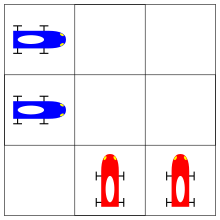Dodgem is a simple abstract strategy game invented by Colin Vout in 1972 while he was a mathematics student at the University of Cambridge as described in the book Winning Ways. It is played on an n×n board with n-1 cars for each player—two cars each on a 3×3 board is enough for an interesting game, but larger sizes are also possible.
Play
The board is initially set up with n-1 blue cars along the left edge and n-1 red cars along the bottom edge, the bottom left square remaining empty. Turns alternate: player 1 ("Left")'s turn is to move any one of the blue cars one space forwards (right) or sideways (up or down). Player 2 ("Right")'s turn is to move any one of the red cars one space forwards (up) or sideways (left or right).
Cars may not move onto occupied spaces. They may leave the board, but only by a forward move. A car which leaves the board is out of the game. There are no captures. A player must always leave his opponent a legal move or else forfeit the game.
The winner is the player who first gets all his pieces off the board, or has all his cars blocked in by their opponent.
The game can also be played in Misere, where you force your opponent to move their pieces off the board.[1]
Theory
The 3×3 game can be completely analyzed (strongly solved) and is a win for the first player—a table showing who wins from every possible position is given in Winning Ways, and given this information it is easy to read off a winning strategy.
David des Jardins showed in 1996 that the 4×4 and 5×5 games never end with perfect play—both players get stuck shuffling their cars from side to side to prevent the other from winning. He conjectures that this is true for all larger boards.
For a 3x3 board, there are 56 reachable positions. Out of the 56 reachable positions, 8 of them are winning, 4 of them are losing, and 44 are draws. [2]
References
- ^ "GamesCrafters :: Games". gamescrafters.berkeley.edu.
- ^ "Gamescrafters Analysis". gamescrafters.berkeley.edu.
- Berlekamp, Elwyn R.; Conway, John Horton; Guy, Richard K. (2003), "Dodgem", Winning Ways for your Mathematical Plays, 3 (2nd ed.), A.K. Peters, pp. 749–750, ISBN 978-1-56881-143-7.
- Gardner, Martin (1987), "Dodgem and Other Simple Games", Time Travel and Other Mathematical Bewilderments, W.H. Freeman & Company, pp. 153–162, ISBN 0-7167-1925-8.
- Gardner, Martin (June 1975), "Mathematical Games", Scientific American, Volume 232, Number 6, Scientific American, Inc., pp. 107–108.
External links
- "Dodgem" . . . any info? Thread from discussion group rec.games.abstract, 1996, containing David desJardins' analysis of the 4x4 and 5x5 games
